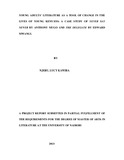| dc.description.abstract | This study examines how two writers,Anthony Mugo in Never Say Never and Edward
Mwangi in The Delegate have presented the challenges of young adults in the contemporary
Kenyan society. Through use of characters that the young adults can identify with, the two
novels have provided the young adults with role models that can greatly impact on the youth.
The idea that literature can be used to boost self understanding is not a new one. Probst, R in
Response Analysis: Teaching Literature in Junior and Senior High School (1988) notes that
in the process of reading literature, some readers’ concepts of the world are re-affirmed,
modified, or even refuted and this can result in changing a reader. This reading of the text can
be a process of self-creation where in searching for a response to the text, in responding and
in finding errors; the reader gains a greater sense of self. This study compares the
protagonists in the novels and also seeks to identify the potential in the books to impact on
the youth in Kenya. This is based on the premise that an individual can be changed by what
one reads. The study will be limited to a close textual reading of the two novels and library
research. The study will rely on carefully selected set of theoretical frameworks and
methodology. The study draws from sociological literary theory and formalism as a guide in
carrying out a research across the five chapters. The first has the introduction, chapter two
and three deals with the male and female protagonist as a role model respectively, chapter
four makes a comparative study of the two texts and chapter five is the conclusion. Young
adulthood is often a tumultuous time in a person’s life. The study suggests that engagement
with honest character portrayals in young adult literature can provide an understanding of
their very real situations. The young adults can therefore learn a lot from this kind of
literature and can use it as a tool of change in their lives. | en |

